 Petzlover
Petzlover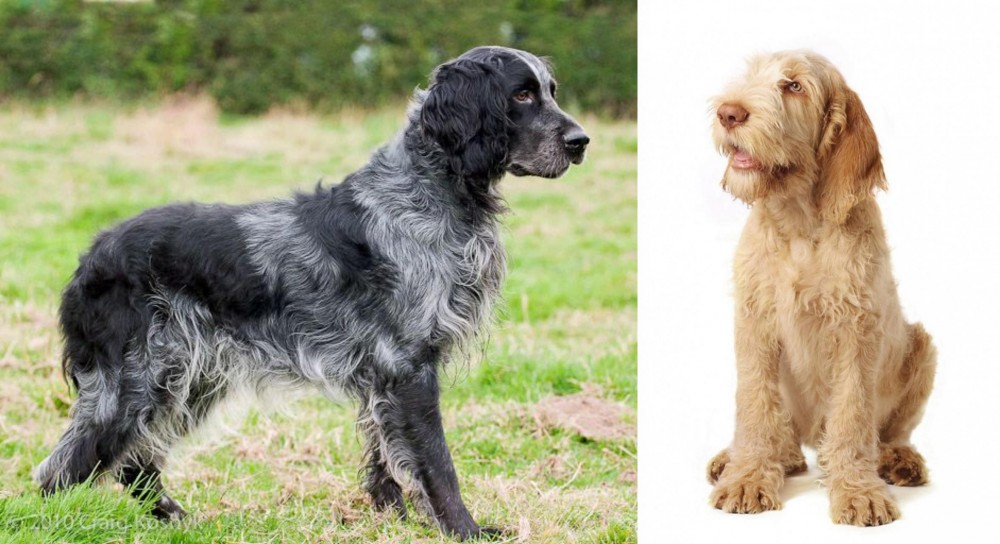 Blue Picardy Spaniel is originated from France but Spinone Italiano is originated from Italy. Blue Picardy Spaniel may grow 9 cm / 3 inches shorter than Spinone Italiano. Blue Picardy Spaniel may weigh 19 kg / 41 pounds lesser than Spinone Italiano. Blue Picardy Spaniel may live 4 years more than Spinone Italiano. Blue Picardy Spaniel may have less litter size than Spinone Italiano. Both Blue Picardy Spaniel and Spinone Italiano requires Moderate Maintenance.
Blue Picardy Spaniel is originated from France but Spinone Italiano is originated from Italy. Blue Picardy Spaniel may grow 9 cm / 3 inches shorter than Spinone Italiano. Blue Picardy Spaniel may weigh 19 kg / 41 pounds lesser than Spinone Italiano. Blue Picardy Spaniel may live 4 years more than Spinone Italiano. Blue Picardy Spaniel may have less litter size than Spinone Italiano. Both Blue Picardy Spaniel and Spinone Italiano requires Moderate Maintenance.
 The Blue Picardy Spaniel is a direct descendent of the French spaniel. It was in the 14th century that recorded descriptions of the French ‘setting dogs’ emerged but it is believed that the spaniel originated before that.
The Blue Picardy Spaniel is a direct descendent of the French spaniel. It was in the 14th century that recorded descriptions of the French ‘setting dogs’ emerged but it is believed that the spaniel originated before that.
The spaniels separated into different regional types where size and colour varied according to the region they were in. It was developed in the northern part of France and bred with Gordon- and English Setters, resulting in a Belton blue color, which is a type of blue ticking coloration. The dog was recognized as a separate breed in France in 1938.
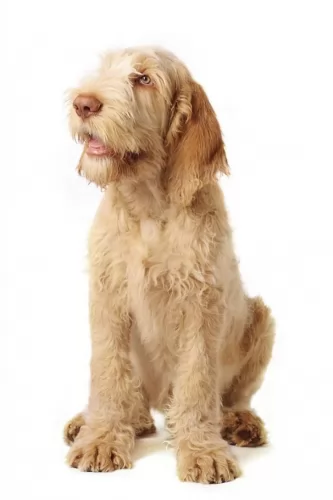 This Italian breed has an ancient blood line tracing all the back to 500 BC. Originally bred to hunt, he is today a friendly, alert and loyal companion. He is intelligent enough to do any job you give him. The Spinone is thought to be one of the oldest gun dogs ever, but it is not entirely clear that he came from Italy. There are some who think he may have come from somewhere in these European countries – Italy, Greece, France, Celtic Ireland, Spain or Russia. However, most believe the breed came from Italy in the Piedmont area.
This Italian breed has an ancient blood line tracing all the back to 500 BC. Originally bred to hunt, he is today a friendly, alert and loyal companion. He is intelligent enough to do any job you give him. The Spinone is thought to be one of the oldest gun dogs ever, but it is not entirely clear that he came from Italy. There are some who think he may have come from somewhere in these European countries – Italy, Greece, France, Celtic Ireland, Spain or Russia. However, most believe the breed came from Italy in the Piedmont area.
The most common thinking is that he is a descendent of the Spanish Pointer and/or the Russian Setter. One other theory is that setters from Greece were brought to the Roman Empire and crossed with a variety of Italian dog to make the coarse haired Spinone we see today. Then the French put in their claim that the breed is a cross of many French pointers.
The theory that counts might just belong to the Italians who believe the ancestor to the Spinone includes the German Wirehaired Pointer, the Pudelpointer and the Wirehaired Pointer. It was not until the 19th century that the name Spinone was officially given to the breed.
Before that it might have been known as a Spinoso and named after a thorn bus in Italy called the Spino. This bush was so thick and sharp that small prey animals learned to hide under it because the predators could not get through it. The Spinone however was able to fight through the briars with its thick, coarse hair and tough skin.
The breed almost became extinct during the second world war as before and after the hunters in Italy had started to use other breeds for hunting. Breeders also began to cross the Spinone with wire hairs like German Wirehaired Pointer, the Wirehaired Pointing Griffon and the Boulet.
The most popular hunting dog in Italy today is the Bracco Italiano while the Spinone is still used for hunting.
 The medium-sized, well muscled Blue Picardy Spaniel has such an amicable expression on his face with such gentle brown eyes that it is difficult to think of him as a gun dog. He is often described as a quiet dog, but lots of fun. He has long legs and stands about 56–61 cm high at the withers, weighing about 19–20 kg. His speckled grey-blue coat with black patches is medium length and wavy and you’ll find typical Setter feathering on the legs, the tail and underside. The medium-length, drooping ears are also covered in silky, feathery hair, a blue/grey coat with black patches and has long feathering on the belly, legs, ears and tail. When the puppies are born they’re white with black patches, but this changes as they mature.
The medium-sized, well muscled Blue Picardy Spaniel has such an amicable expression on his face with such gentle brown eyes that it is difficult to think of him as a gun dog. He is often described as a quiet dog, but lots of fun. He has long legs and stands about 56–61 cm high at the withers, weighing about 19–20 kg. His speckled grey-blue coat with black patches is medium length and wavy and you’ll find typical Setter feathering on the legs, the tail and underside. The medium-length, drooping ears are also covered in silky, feathery hair, a blue/grey coat with black patches and has long feathering on the belly, legs, ears and tail. When the puppies are born they’re white with black patches, but this changes as they mature.
The Blue Picardy Spaniel is a loyal and devoted companion, who just loves to spend time with his human family. He loves to work hard and play hard and he makes a splendid family pet. He’ll also get along well with other pets. Treat him with love and care and you’ll find that the Blue Picardy Spaniel is an even-tempered pet who wants to please. Being alert, he will bark to warn you of strangers.
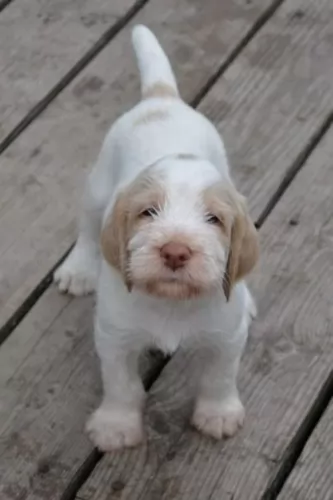 The breed is made up of strong, solid and muscled dogs that have an almost square build. His legs are made to travel any terrain and his head is long with an occipital that is pronounced and unique to the Spinone. They are said to have “human appearing eyes”, with a docked tail in countries allowing it and webbed paws.
The breed is made up of strong, solid and muscled dogs that have an almost square build. His legs are made to travel any terrain and his head is long with an occipital that is pronounced and unique to the Spinone. They are said to have “human appearing eyes”, with a docked tail in countries allowing it and webbed paws.
Shorter hair covers their feet, head, legs, muzzle and ears. They have longer hair on their eyebrows and it is stiff, with soft hair on the muzzle and cheeks with a beard and mustache. It is a single coated dog though the coat is rough. They should have skin, lips, nose, and pads in colors that coordinate with their coats. For white dog it is a red-orange color, brown in dogs that are roan colored and dark red-orange in the orange and white colored dog.
 The Blue Picardy Spaniel is a gentle, intelligent breed and he responds well to training. He is such an easy going dog who wants to please his owners. They also do well with children and other pets, making him a wonderful family pet.
The Blue Picardy Spaniel is a gentle, intelligent breed and he responds well to training. He is such an easy going dog who wants to please his owners. They also do well with children and other pets, making him a wonderful family pet.
This excellent sporting dog bred in the Picardy region of France is sociable and amicable, a sought after companion animal in France. He is highly trainable breed and his wonderful nature makes him a wonderful choice for first-time dog owners. He is a gentle all-rounder who loves to be with family, making him an exceptional friend.
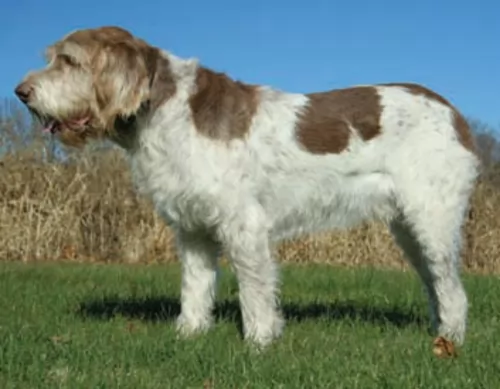 3.Adaptability – Young dogs need a lot of attention but they don’t need a lot of space. The young dogs are energetic while the adult dogs are laid-back. They need exercise every day and at least a small back yard.
3.Adaptability – Young dogs need a lot of attention but they don’t need a lot of space. The young dogs are energetic while the adult dogs are laid-back. They need exercise every day and at least a small back yard.
 The Blue Picardy Spaniel is considered a healthy breed and there are no known genetic health issues. He is a rare dog breed and not excessively bred, meaning they aren’t prone to genetic health problems. When he is loved and well looked after, he can reach 14 years of age and beyond.
The Blue Picardy Spaniel is considered a healthy breed and there are no known genetic health issues. He is a rare dog breed and not excessively bred, meaning they aren’t prone to genetic health problems. When he is loved and well looked after, he can reach 14 years of age and beyond.
You won’t find more health issues with this breed than with other gun dogs. Always be looking out for hip dysplasia, a malformation of the hip joint. The socket of the hip is too shallow, resulting in damage to the joints of the dog, more so as it ages. Symptoms of hip dysplasia include stiffness and trouble with getting up after lying down.
 This is an ancient breed with not a lot of documented genetic issues, but it does have one deadly condition.
This is an ancient breed with not a lot of documented genetic issues, but it does have one deadly condition.
• Cerebellar ataxia (CA) is inherited and hits the puppies. Because it is a recessive gene both the mother and father must carry it for the puppy to inherit it. This makes it less likely than it would be otherwise. Puppies with the condition do not live more than a year. Since it is a genetic problem there is now a test for it that identifies carriers at a 95% accuracy rate.
• Like many other large breed dogs, they are susceptible to hip dysplasia. This can cause arthritis and/or lameness. There are now hip replacement surgeries available for this condition.
• Bloat is again common in large dogs and you need to watch for it with the Spinone. It can be deadly if not treated immediately. Let your dog rest quietly after eating. Do not let her exercise or play energetically after eating.
 The Blue Picardy is an energetic gun dog and he will certainly require a good deal of exercise. If he isn’t running around on a farm you will need to take him for walks regularly or let him off the leash in the park. He is always ready for ball games and just loves to play. It’s why he gets on well with children too- he loves the fun and games he gets.
The Blue Picardy is an energetic gun dog and he will certainly require a good deal of exercise. If he isn’t running around on a farm you will need to take him for walks regularly or let him off the leash in the park. He is always ready for ball games and just loves to play. It’s why he gets on well with children too- he loves the fun and games he gets.
He’ll need a high quality dog food that has been specially formulated for high energy dogs. Always follow the directions on the packaging. Home made food with meat, rice and vegetables is always a welcome change and remember to ensure he gets some raw meat into his diet too. Never deprive him of fresh, cool water. This should be readily available to him 24/7.
The Blue Picardy Spaniel is a moderate shedder with a couple of heavier shedding periods during the year. His grooming requirements are pretty moderate too and he will require a good brush twice a week to get rid of those loose hairs.
Other basic care for your beautiful pet includes clipping his nails, brushing his teeth 2 or 3 times a week, making use of a special dog toothbrush and toothpaste. His ears should certainly be checked for infection.
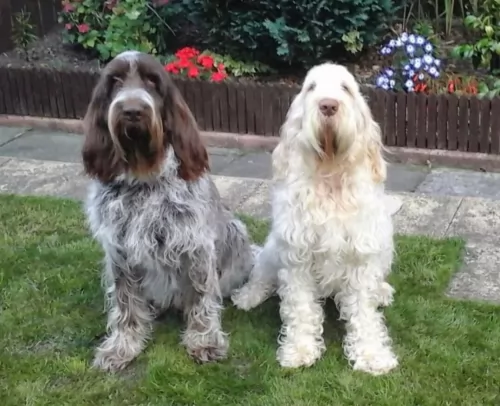 1Feeding the puppy – feed a high quality dog food for puppies of large breeds. Feed 3-4x day but don’t overfeed or let him exercise after eating even as a puppy.
1Feeding the puppy – feed a high quality dog food for puppies of large breeds. Feed 3-4x day but don’t overfeed or let him exercise after eating even as a puppy.
2.Feeding the adult - feed a high quality dog food for large breeds. Feed 1-2X day but don’t overfeed or let him exercise after eating.
4. Games and Exercises – The Spinone is an active breed, but not a fast dog. In fact, they like to travel at a trot so it becomes a great dog for jogging or running with. They love to jump, track, hunt, hike. They do well with agility, retrieving, flyball, carting, being a therapy dog, a rescue dog and a watchdog.